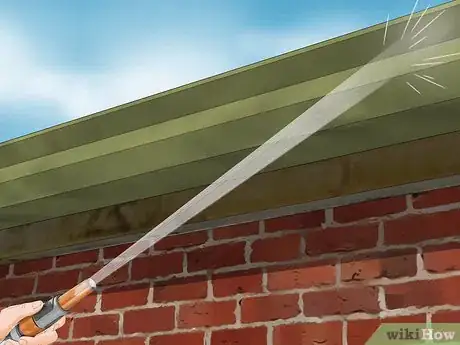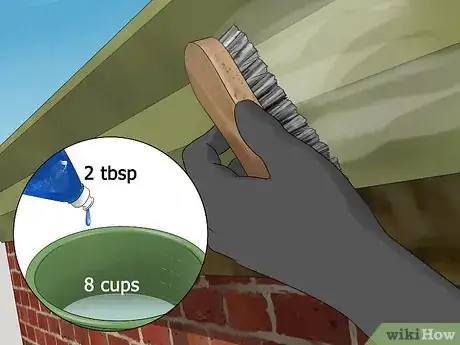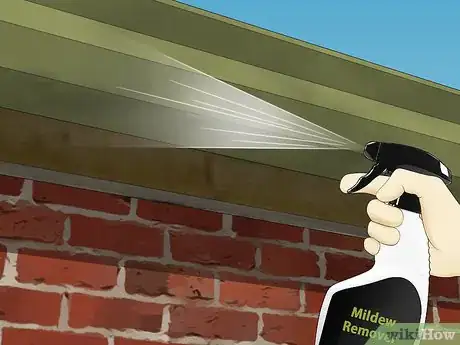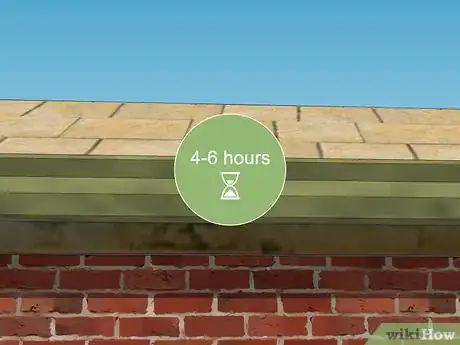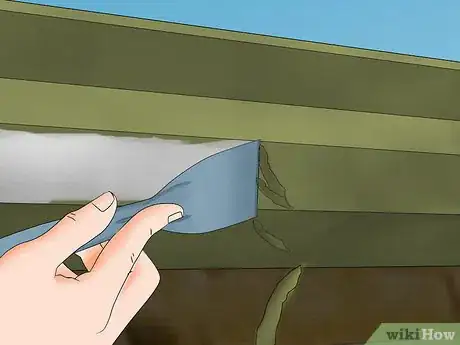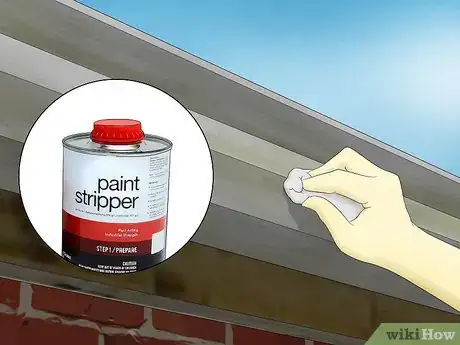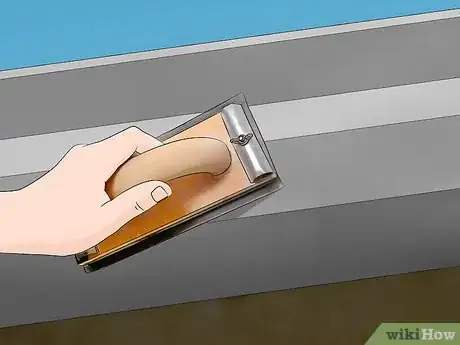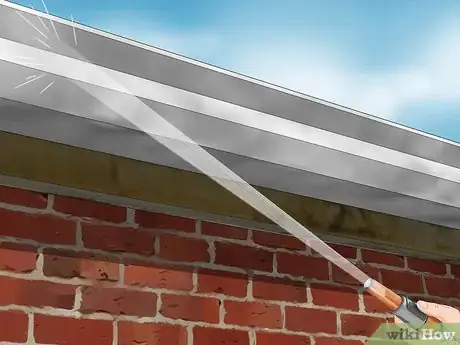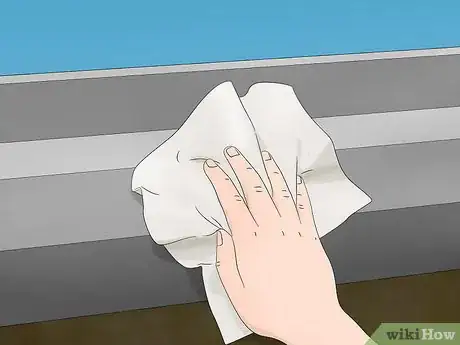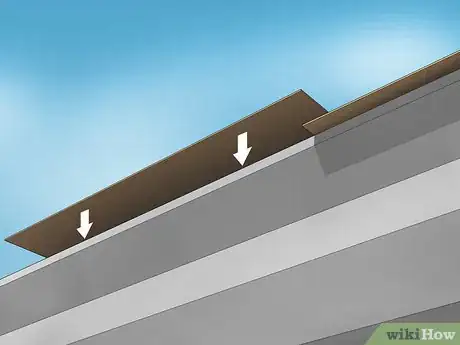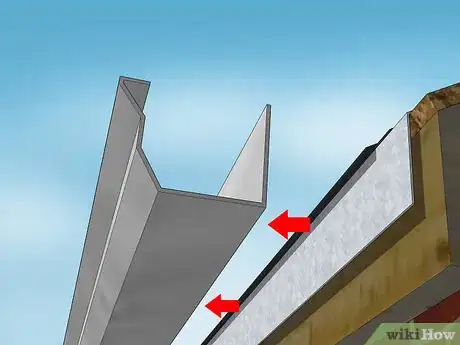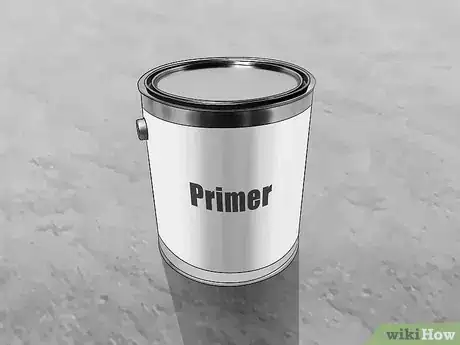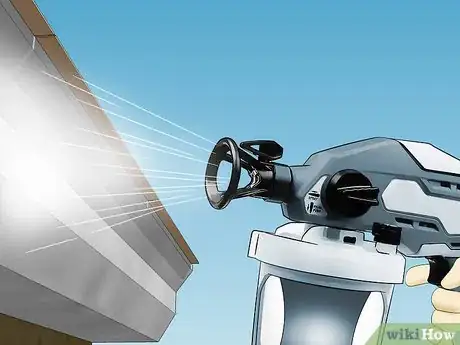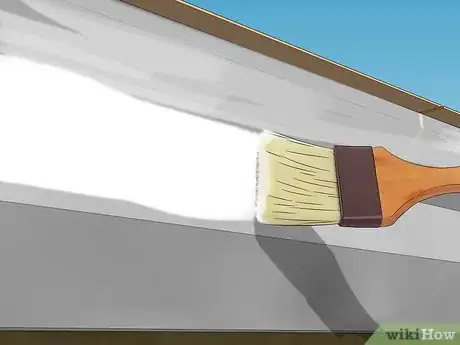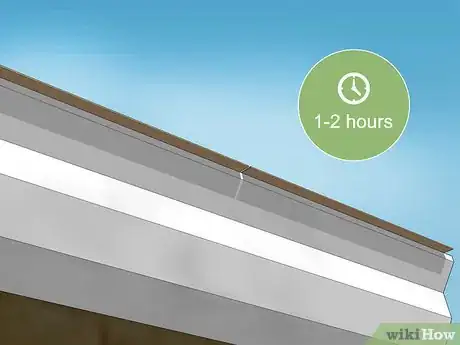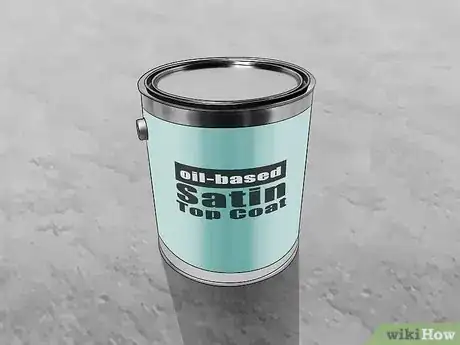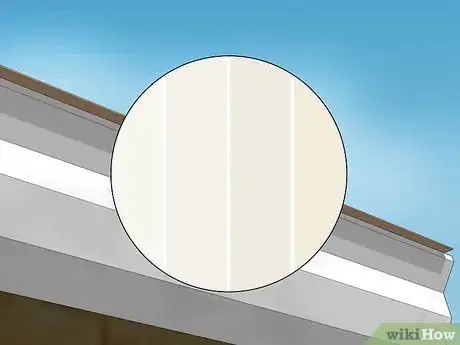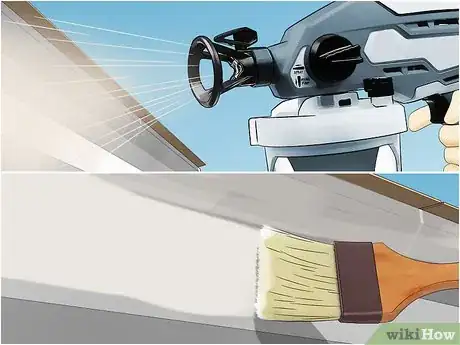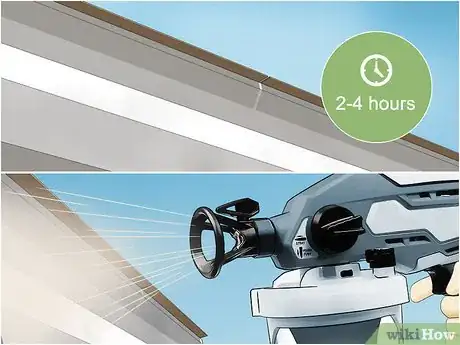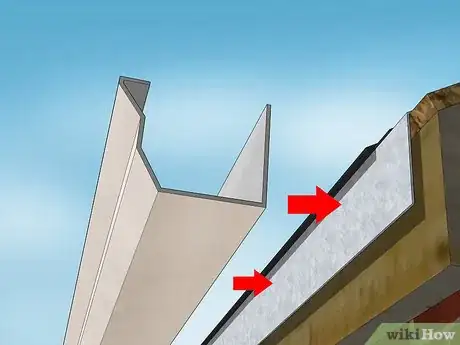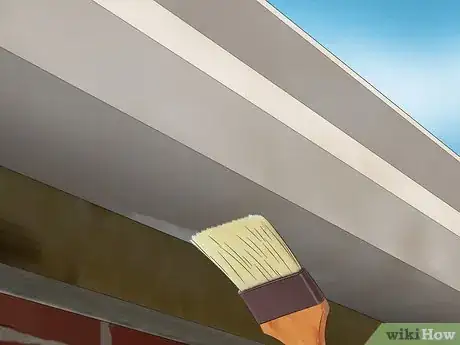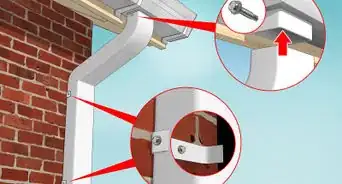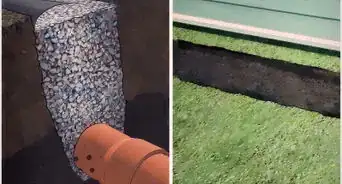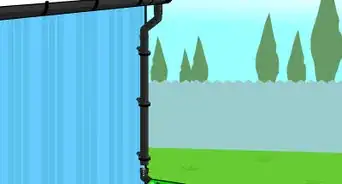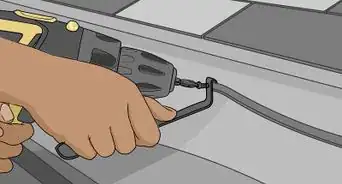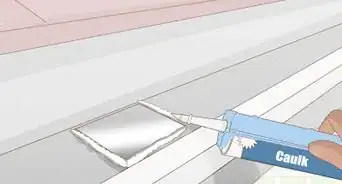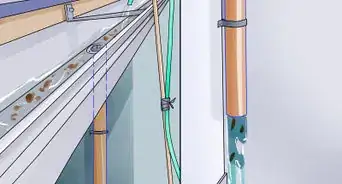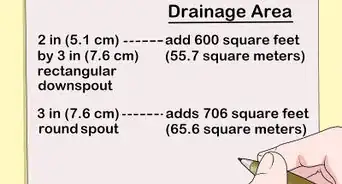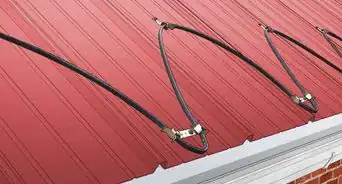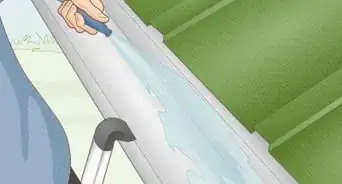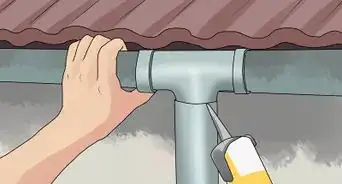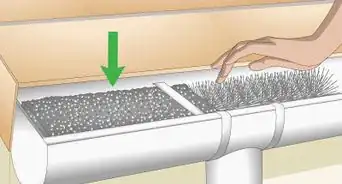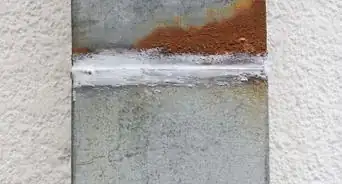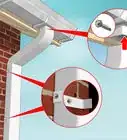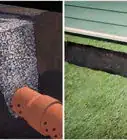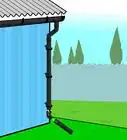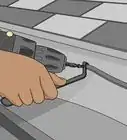This article was co-authored by Patrick Coye. Patrick Coye is the owner and operator of Patrick’s Painting & Home Improvement in Alexandria, Virginia. With over 15 years of experience in residential construction, Patrick specializes in painting, wallpaper removal/installation, drywall, staining decks and fences, and kitchen cabinetry painting. To date, Patrick and his team have painted over 2,000 houses and stained over 800 decks. Patrick's Company won a "Top Job" award from the American Painting contractor magazine in 2020.
There are 7 references cited in this article, which can be found at the bottom of the page.
This article has been viewed 62,785 times.
Your gutters may be due for a paint job if they start to peel or appear worn and dirty. Painting your gutters is a pretty straightforward task you can do yourself, provided you have the right tools and take your time. Start by washing the gutters so they are free of dirt and debris. Strip and sand them so they are ready to be painted. Then, prime the gutters and apply a top coat so they appear smooth, clean, and nicely painted.
Steps
Washing the Gutters
-
1Use a power washer to clean the gutters fast. Start by cleaning off dirt and debris on the gutters. Rent a power washer or buy one at your local hardware store or online. The power washer will have an extendable arm, making it easy and quick for you to clean the gutters.[1]
- You can stand on a ladder if you'd like to get closer to the gutters to clean them.
- Ensure your gutters aren’t loose or severely rusted prior to power-washing them to avoid potential damage.
- Do a thorough rinse of the gutters using the power washer, making sure you spray off any caked on dirt, debris, or flaking paint in the corners and underneath the gutters.
-
2Scrub the gutters with mild soap and water if you don't have a power washer. Combine 2 tablespoons (30 ml) of mild soap with 8 cups (1.9 l) of water. Stand on a ladder, directly underneath the gutters. Dip a horsehair brush or a brush with soft bristles in the soapy water and scrub down the gutters well. This method will require a bit more elbow grease and take more time.
- You may find it easier to take off the gutters and place them on a flat surface to scrub them down. Make sure you lay them out in order as you take them off so it is easy for you to put them back together.
Advertisement -
3Clean the gutters with a mildew retardant if they have mildew or mold. If you notice your gutters have mildew on them, remove it with a retardant. Look for a mildew retardant at your local hardware store or online. The retardant will contain chemicals that will help to remove mildew and prevent it from forming.[2]
- Follow the application instructions on the label. Do not apply more than recommended.
- Wear gloves and a face mask when applying the mildew retardant so you are protected.
-
4Let the gutters air dry. Once you have cleaned the gutters well, allow them to dry for 4-6 hours, preferably on a sunny day. Flip the gutters over every few hours to allow water to drain out of the cracks and crevices.
- It's essential that the area is extremely clean before you apply your new layer of paint.[3]
Stripping, Sanding, and Sealing
-
1Strip off the old paint with a plastic putty knife. A plastic putty knife is ideal, as it will not scratch the gutters like a metal or steel wire brush might. Scratch off old paint on the gutters with the putty knife, putting pressure on the knife as you scrape off the paint using long strokes. Try to get off as much of the old paint as you can.[4]
-
2Apply paint stripping chemicals. If the old paint is really caked onto the gutters, you can use paint stripping chemicals to make it easier to take it off. Apply a small dab of paint stripper to a rag. Use the rag to scrub off the paint.[5]
- Do not use too much paint stripper, as the chemicals can be bad for you to inhale. Dab on small amounts so you do not apply too much.
- Wear gloves and a face mask to protect yourself from the fumes.
-
3Sand the gutters with a medium sanding block. Work the gutters over lightly with the sandpaper to remove rough patches and get rid of any remaining old paint. Sanding will create a smooth surface and help the new paint to adhere better to the gutters.[6]
- To save time, use a palm sander instead of a sanding block.
- Try to make the surface of the gutters as smooth as possible. Take your time, sanding the sides and bottom of the gutters.
-
4Rinse the gutters with water to remove sand residue. Use a hose or a wet cloth to remove any residue from sanding on the gutters. Check that the gutters feel smooth to the touch.[7]
-
5Dry the gutters with a cloth. Check that there is no remaining water or sand residue on the gutters. Wait for the gutters to be completely dry before you prime them.
-
6Seal the joints in the gutters. Use a gutter seal compound to seal the joints where the gutters and downspouts connect. Let the compound dry completely before priming the gutters. If you have seamless gutters, you can skip this step.
Priming the Gutters
-
1Use pieces of cardboard to protect your home from the paint. Rest small pieces of cardboard or poster board on top of and behind the gutters to make sure paint does not get on your home. Use painter’s tape to attach the cardboard to the top of the gutters, especially if it’s windy outside.[8]
- Thoroughly cover the soffit, fascia, and siding of your home so paint does not get on it.
- Use old boxes or scrap cardboard. Cut the cardboard to fit the top of the gutters, especially the corners.
- You do not need to use painter's tape to mask the house as long as you place cardboard on the gutters to protect the house. You will be working closely with the primer and paint so the risk of getting a lot of it on your home is low.
-
2Take the gutters off if you don’t want to use cardboard. Use a screwdriver to take off the gutters so you do not damage them. Place them on a painter’s tarp outside in your yard. Lay them down in order so you can put them back up easily. You can then prime and paint the gutters without having to worry about getting paint on your home.
-
3Get an oil-based primer that is rust-preventing. Make sure the primer is made for use on gutters. Buy primer at your local hardware store or online.[9]
- The primer will help the top coat adhere better to the gutters. It will also help to prevent the top coat from flaking or peeling.
-
4Use an airless sprayer to apply the primer quickly. If you have left the gutters on your home and want to prime them fast, use a paint sprayer. Rent a paint sprayer or buy one at your local hardware store.[10]
- If you opt to use a sprayer, mask the roof, fascia, and siding to prevent overspray from getting on your home. Keep a damp cloth on hand to wipe up any paint that gets on unwanted areas.
- Use the low pressure setting on the sprayer to apply one light coat of primer. Spray the sides and bottom of the gutters to prime them.
- Wear a respirator mask when you use the sprayer to protect yourself from the paint fumes.
-
5Apply a coat of primer with a paintbrush or roller if you don't have a sprayer. If you’d prefer to prime the gutters the old-fashioned way, use a paintbrush or roller that is 3 to 4 inches (7.6 to 10.2 cm) wide. Paint a thin coat of primer on the sides and bottom of the gutters.
- Do not apply too much primer, as this can make it difficult for the top coat to spread smoothly and evenly on the gutters.
-
6Allow the primer to air dry. If you use a fast drying oil-based primer, it will usually take about 1-2 hours to dry. Check the label on the primer to determine the drying time.
- Make sure the primer is completely dry before you apply the top coat.
Applying the Top Coat
-
1Choose an oil-based satin top coat. The satin or gloss finish will protect the gutters from water damage. An oil-based top coat will dry more quickly and leave a more even application. Buy top coat for the gutters at your local hardware store or online.[11]
-
2Select a color that complements your home color. Most homeowners will go for classic white for the gutters, as it looks clean and simple. You can pick white for the gutters as an accent color if your home is a dark color.
- If your home is gray or brown, you may paint the gutters gray or brown as well so they blend in.
-
3Apply a thin layer of top coat with a paintbrush or a sprayer. Use a small amount of top coat on the paintbrush so it spreads thinly on the gutters. Correct any runs in the paint using the brush.
- You can also apply a thin layer of top coat with a paint sprayer if you’d prefer. Only spray over the gutters once with the top coat so it does not become too thick.
-
4Let the paint dry, then apply a second coat. Allow 2-4 hours for the top coat to dry completely. If you are using a quick-drying top coat, it may take less time for it to dry. Apply another layer of top coat with a paint brush or a paint sprayer so the color appears even.
-
5Replace the gutters if you took them down. Once the paint has dried completely, replace the gutters. Make sure you put them back up in order and that they are secure.
-
6Touch up the gutters as needed. Stand back and look at the freshly painted gutters. Use a small paint brush dipped in top coat to touch up any spots you may have missed.
Expert Q&A
Did you know you can get expert answers for this article?
Unlock expert answers by supporting wikiHow
-
QuestionWhat kind of paint do you use on gutters?
 Patrick CoyePatrick Coye is the owner and operator of Patrick’s Painting & Home Improvement in Alexandria, Virginia. With over 15 years of experience in residential construction, Patrick specializes in painting, wallpaper removal/installation, drywall, staining decks and fences, and kitchen cabinetry painting. To date, Patrick and his team have painted over 2,000 houses and stained over 800 decks. Patrick's Company won a "Top Job" award from the American Painting contractor magazine in 2020.
Patrick CoyePatrick Coye is the owner and operator of Patrick’s Painting & Home Improvement in Alexandria, Virginia. With over 15 years of experience in residential construction, Patrick specializes in painting, wallpaper removal/installation, drywall, staining decks and fences, and kitchen cabinetry painting. To date, Patrick and his team have painted over 2,000 houses and stained over 800 decks. Patrick's Company won a "Top Job" award from the American Painting contractor magazine in 2020.
Painting Specialist
Warnings
- Always wear gloves and a face mask when working with paint or chemicals.⧼thumbs_response⧽
- Make sure the ladder is on a flat, stable surface and is secure before you climb it.⧼thumbs_response⧽
Things You’ll Need
- Power washer
- Mild soap and water
- Horsehair scrub brush
- Mildew retardant
- Paint stripping chemicals
- Plastic putty knife
- Sandpaper
- Gutter seal compound
- Primer
- Top coat
- Paintbrushes and/or rollers
- Airless paint sprayer
- Ladder
References
- ↑ https://www.youtube.com/watch?v=C_NvArQqFj8&feature=youtu.be&t=19
- ↑ https://www.roddapaint.com/for-your-home/home-projects/exterior-general-projects/gutters-downspouts
- ↑ Patrick Coye. Painting Specialist. Expert Interview. 19 August 2020.
- ↑ https://www.thisoldhouse.com/ideas/how-to-strip-years-paint-house
- ↑ https://www.homeadvisor.com/r/stripping-paint/
- ↑ https://www.roddapaint.com/for-your-home/home-projects/exterior-general-projects/gutters-downspouts
- ↑ https://www.roddapaint.com/for-your-home/home-projects/exterior-general-projects/gutters-downspouts
- ↑ https://www.youtube.com/watch?v=C_NvArQqFj8&feature=youtu.be&t=27
- ↑ https://www.roddapaint.com/for-your-home/home-projects/exterior-general-projects/gutters-downspouts
- ↑ https://www.youtube.com/watch?v=C_NvArQqFj8&feature=youtu.be&t=44
- ↑ https://www.roddapaint.com/for-your-home/home-projects/exterior-general-projects/gutters-downspouts
- ↑ Patrick Coye. Painting Specialist. Expert Interview. 19 August 2020.
- ↑ Patrick Coye. Painting Specialist. Expert Interview. 19 August 2020.
